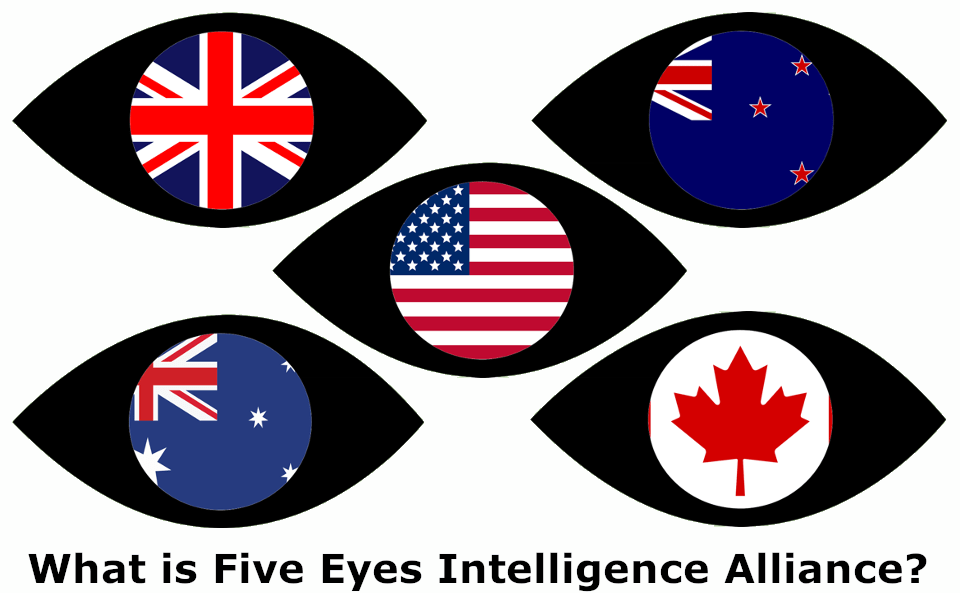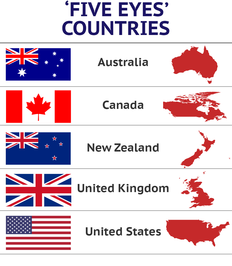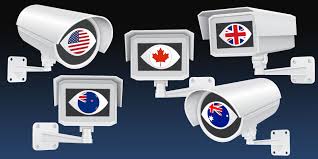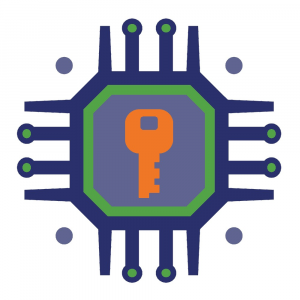Disclosure: Privacy Australia is community-supported. We may earn a commission when you buy a VPN through one of our links. Learn more.
Five Eyes Surveillance Explained

There’s no denying that Internet anonymity has been declining for some time.
But contrary to popular opinion, public anonymity and spying have been issues for decades.
In fact, many of the problems we see today regarding citizens’ privacy and Internet anonymity can be traced to the Five Eyes intelligence alliance.
A collaboration of five democratic countries who’ve agreed to shared intelligence information with one another for matters of national security.
This isn’t a bad thing in and of itself. But there is evidence that the Five Eyes intelligence alliance has overstepped its bounds more than once. In many cases, it may be that the Five Eyes group actively spies on domestic citizens and shares that domestic intelligence with its allies.
Table of Contents:
- What is Five Eyes?
- What Member Countries Are Included?
- What Is Five Eyes Intended to Do?
- What Does Five Eyes Mean for Normal Australians?
- How to Protect Yourself from Five Eyes Surveillance?
What is Five Eyes?

Simply put, the “Five Eyes” is a five-member intelligence alliance comprised of several Anglophone countries.
While the Five Eyes technically got its start in the aftermath of World War II, it officially became an organization of its own in 1955 when the formal treaty was signed.
The United States and the United Kingdom (the first two members) had expanded the alliance to allow three additional members and several other “third parties”.
The Five Eyes are countries that agree to share top-secret intelligence information with one another for the purposes of ensuring the security of their respective countries.
The idea is that, where one country can’t gather enough intelligence to safely guard their own borders or foreign interests, five countries might be able to collaborate to get the job done.
In the modern era, the Five Eyes have come under serious criticism for their lack of accountability and their potential to violate the privacy rights of their countries’ citizens.
However, the debate is ongoing and it’s not totally clear how much power the Five Eyes three really has or how far it allows its member countries to spy on its citizens, if at all.
What Member Countries Are Included?
The five primary “Eyes” are the main member countries that share the vast majority of intelligence with one another, including human intelligence (i.e. spy information), signal intelligence, security intelligence, defense intelligence, and geo intelligence. These five countries are:
- ☑️ Australia
- ☑️ Canada
- ☑️ New Zealand
- ☑️ United Kingdom
- ☑️ United States
In addition to the five primary countries mentioned above, several third-party or ancillary countries are allowed to share limited information and receive limited intelligence in return. Some of these countries include Japan, South Korea, Israel, and Singapore.
What Is Five Eyes Intended to Do?
The history of the Five Eyes stretches back to the original Atlantic Charter in 1941 which helped to lay out combined Allied goals following World War II.
Over time, the United States and the UK collaborated more and more frequently for intelligence sharing and gathering, and this partnership became official as the Cold War heated up.
As time passed, other countries joined the official organization. For example, Australia and New Zealand helped to gather intelligence in the Asia-Pacific region to support the United States and its operations in the area.
The goal of the Five Eyes intelligence alliance is simple:
- ☑️ Protect the interests of its member countries
- ☑️ Defend the member countries from counterintelligence operations
- ☑️ Promote the sharing of any gathered intelligence between member countries
In theory, this alliance makes the intelligence departments for each member country a little more versatile and effective. While no one country can effectively gather intelligence for all potential threats, all five countries’ networks can pull together and achieve even greater efficacy.
Five Eyes Intelligence Network Controversies

However, the Five Eyes intelligence network is not without its detractors and controversies.
Specifically, there have been many controversies surrounding the sharing of domestic espionage.
Famous leaks, such as those by Edward Snowden in the United States, have revealed documentation showing that the Five Eyes have intentionally spied on each other’s citizens and shared collected information as well.
For example:
2013 saw the Canadian federal judge Richard Mosley rebuke the Five Eyes due to outsourcing surveillance of local Canadians to overseas intelligence agencies.
2014 saw New Zealand’s government inquire with its own intelligence and security agencies to determine if any monetary contributions had been made from other member countries without national government approval.
2014 also saw the institutions of the European Union interrogate the intelligence agencies for Canada and New Zealand and find that they may have actively shared personal data for EU citizens in the legal contexts.
All this goes to show that, while the Five Eyes network is undoubtedly effective, it also has its issues that Australian citizens should be aware of.
What Does Five Eyes Mean for Normal Australians?
Regular Australians likely don’t have much to fear from the Five Eyes intelligence network, as it’s primarily focused on gathering foreign intelligence and focusing on external threats.
But this is not entirely true, and Five Eyes does indicate that the Australian intelligence agencies may gather more domestic information than initially thought.
There are several big issues with the Five Eyes intelligence network that Australians should be aware of.
No Accountability
Although the Five Eyes Intelligence Oversight and Review Council was created in over to provide oversight for the five countries comprising the Five Eyes intelligence network and their third-party members, there are still significant issues in terms of oversight.
Specifically, there isn’t any domestic legislation that informs the member countries whether or not they can share local or domestic intelligence.
This means that these activities aren’t backed by democratic legitimacy, so citizens have no say in whether or not they are being spied on by foreign countries.
Furthermore, the third-party rules contained within the Five Eyes treaties and documents don’t allow the disclosure of any interagency information to third parties, meaning third-party countries cannot adequately contest any decisions made by the main five members.
Lobbying Against Encryption

The Five Eyes intelligence alliance has repeatedly warned about strong encryption. Specifically, they believe that strong encryption will make their job harder (which it will, and on purpose!).
This has resulted in significant push back against encryption laws and privatization of encryption. In other words, they don’t want private citizens to have the power to protect their data or documents from government oversight or surveillance.
This can represent a huge threat to the democratic process and may prevent Australian citizens from strengthening their encryption efforts in the future.
Privatization of Espionage
Lastly, the Five Eyes intelligence alliance has outsourced certain surveillance activities to corporations. In doing so, they have also not limited those corporations’ access to certain classified information. This contributes to the growing privatization of espionage activities.
As a result, it raises many legal questions about who is allowed access to citizens’ or government data. Many of us do not want private corporations being responsible for espionage activities for both the inherent security risk and because corporations are already considered to be powerful enough by many.
How to Protect Yourself from Five Eyes Surveillance?
While the Five Eyes intelligence alliance is powerful, there are ways you can minimize its ability to spy on your activities.
VPN

Using a VPN is a great idea. VPNs or virtual private networks allow you to mask your IP address and visit websites without being easily tracked by government agencies.
It’s not foolproof, but even a cheap VPN is a lot better than relying on your regular Internet service provider for basic encryption. Fortunately, there are plenty of excellent VPN options available, even if you’re on a tight budget.
Tor Browser
You can also look into the Tor browser, which helps to mask your digital identity online by funneling your traffic into a scrambler and making it almost impossible to be tracked unless the government already traces your activities.
Good secure browsers of any kind are also a good idea.
Digital Hygiene
Lastly, practicing general digital hygiene – such as using strong password managers and not putting any of your personal information online – can go a long way toward making your activities and browsing habits more difficult to discern or record.
This is good not only for avoiding Five Eyes surveillance but also for general identity theft protection. In today’s digital environment, identity theft is more common than ever and it’s all too easy for cybercriminals to get access to personal information due to weak passwords or improper browsing habits.
Summary
The Five Eyes intelligence alliance is widely regarded as a formidable global entity that plays a crucial role in upholding security and countering espionage activities, particularly those executed by countries such as China and Russia, which do not align with democratic values.
While the alliance’s contributions in mitigating foreign threats are undeniable, it is imperative to remain cognizant of the inherent risks associated with its extensive powers. There is the potential for these powers to be misused, leading to surveillance of Australian citizens instead of solely focusing on external adversaries.
To fortify Australia’s resilience against unwarranted government surveillance, it is vital for individuals to actively engage in democratic processes. Regularly exercising the right to vote empowers citizens to elect representatives who prioritize privacy protection and advocate for responsible surveillance practices. Additionally, expressing opinions and concerns about these activities can effectively raise awareness and foster public discourse, ultimately strengthening Australia’s resistance to government spying.
By actively participating in democratic processes and voicing concerns, citizens can contribute to shaping policies that strike a balance between national security and individual privacy, ensuring that government surveillance practices align with democratic principles and respect the rights of Australian citizens.
You Might Also Like:



